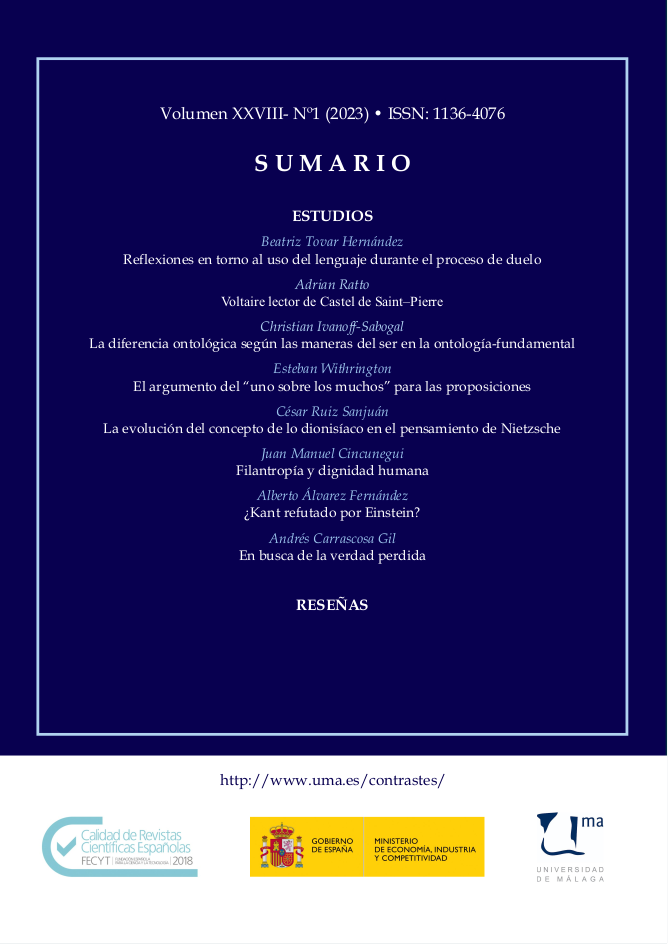El argumento del «uno sobre los muchos» para las proposiciones
DOI:
https://doi.org/10.24310/Contrastescontrastes.v28i1.13979Palabras clave:
SIGNIFICADOS, PROPOSICIONES, PLATONISMO, UNO-SOBRE-LOS-MUCHOS, NATURALISMOResumen
Los significados de enunciados y pensamientos se consideran comúnmente en la semántica filosófica como objetos abstractos, llamados «proposiciones», que explican cómo diferentes enunciados y pensamientos pueden ser sinónimos y que constituyen los principales portadores de la verdad. Argumento que los significados son propiedades naturales que juegan roles causales en el mundo, que el tipo de pensamiento del «uno sobre los muchos» que subyace a la caracterización de significados compartidos como objetos abstractos está equivocado y que el hecho que los enunciados y pensamientos tengan valores de verdad en virtud de sus significados no implica que los significados sean portadores de la verdad.
Descargas
Métricas
Publicación Facts
Perfil de revisores N/D
Información adicional autores
Indexado: {$indexList}
-
Indexado en
- Sociedad Académica/Grupo
- N/D
- Editora:
- Universidad de Málaga
Citas
Aristotle. Metaphysics. Translated by W. D. Ross. Clarendon Press / Oxford 1908.
Armstrong, D. (1978). Nominalism and Realism: Universals and Scientific Realism. Vol. 1. Cambridge University Press.
Armstrong, D. (2004). Truth and Truthmakers. Cambridge University Press.
Austin, J. L. (1950). «Truth». Proceedings of the Aristotelian Society, supp. Vol. 24, pp. 111-128.
Balaguer, M. (1998). «Attitudes without Propositions». Philosophy and Phenomenological Research, Vol. 58, No. 4, pp. 805-826. https://doi.org/10.2307/2653723
Bealer, G. (1998). «Propositions». Mind, Vol. 107, Issue 425, pp.1-32. https://doi.org/10.1093/mind/107.425.1
Church, A. (1956a). «Propositions and Sentences». The Problem of Universals, by I. M. Boche?ski, A. Church, N. Goodman. University of Notre Dame Press, pp. 3-11.
Church, A. (1956b). Introduction to Mathematical Logic. Princeton University Press.
Devitt, M. (1996). Coming to Our Senses: A Naturalistic Program for Semantic Localism. Cambridge University Press.
Devitt, M. (2010). Putting Metaphysics First. Oxford University Press.
Frege, G. (1956). «The Thought». Translated by A. M. and Marcelle Quinton. Mind, Vol. 65, No. 259, pp. 289-311.
Haack, S. (1978). Philosophy of Logics. Cambridge University Press.
Horwich, P. (1998). Truth (second edition). Oxford University Press.
Kaplan, D. (1989). «Demonstratives». Themes for Kaplan. Almog, Perry and Wettstein (eds.). Oxford University Press, pp. 481-563.
Kirkham, R. (1992). Theories of Truth: A Critical Introduction. The MIT Press.
Moltmann, F. (2003). «Propositional Attitudes without Propositions». Synthese, 135, pp. 77–118. https://doi.org/10.1023/A:1022945009188
Pitcher, G. (ed.) (1964). Truth. Prentice-Hall: Englewood Cliffs.
Plato. Republic. Translated by C. D. C. Reeve. Hackett Publishing Company 2004.
Quine, W.V.O. (1961). From a Logical Point of View. Harvard University Press.
Russell, B. (1921). The Analysis of Mind. George Allen and Unwin.
Schiffer, S. (1992). «Belief Ascription». The Journal of Philosophy, Vol. 89, No. 10, pp. 499-521. https://doi.org/10.2307/2941005
Descargas
Publicado
Cómo citar
Número
Sección
Licencia
Esta revista provee acceso libre inmediato a su contenido bajo el principio de hacer disponible gratuitamente la investigación al público. Todos los contenidos publicados en Contrastes. Revista internacional de Filosofía, están sujetos a la licencia Creative Commons Reconocimento-NoComercia-Compartirigual 4.0 cuyo texto completo puede consultar en <http://creativecommons.org/licenses/by-nc-sa/4.0>
Es responsabilidad de los autores/as obtener los permisos necesarios de las imágenes que están sujetas a derechos de autor.
Los autores/as cuyas contribuciones sean aceptadas para su publicación en esta revista conservarán el derecho no exclusivo de utilizar sus
contribuciones con fines académicos, de investigación y educativos,
incluyendo el auto-archivo o depósito en repositorios de acceso abierto de cualquier tipo.
La edición electrónica de esta revista esta editada por la Editorial de la
Universidad de Málaga (UmaEditorial), siendo necesario citar la procedencia en cualquier reproducción parcial o total.










5.png)
